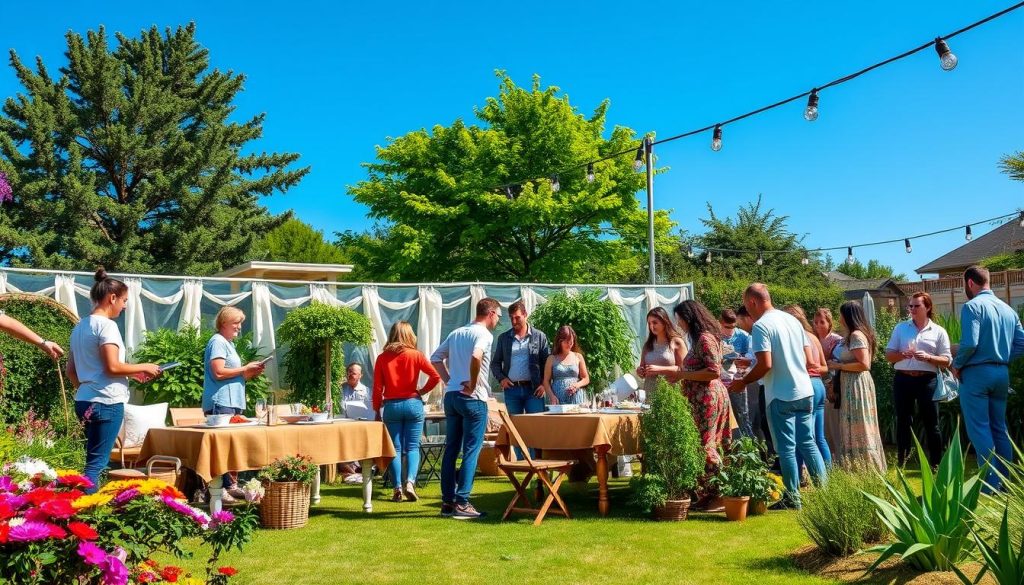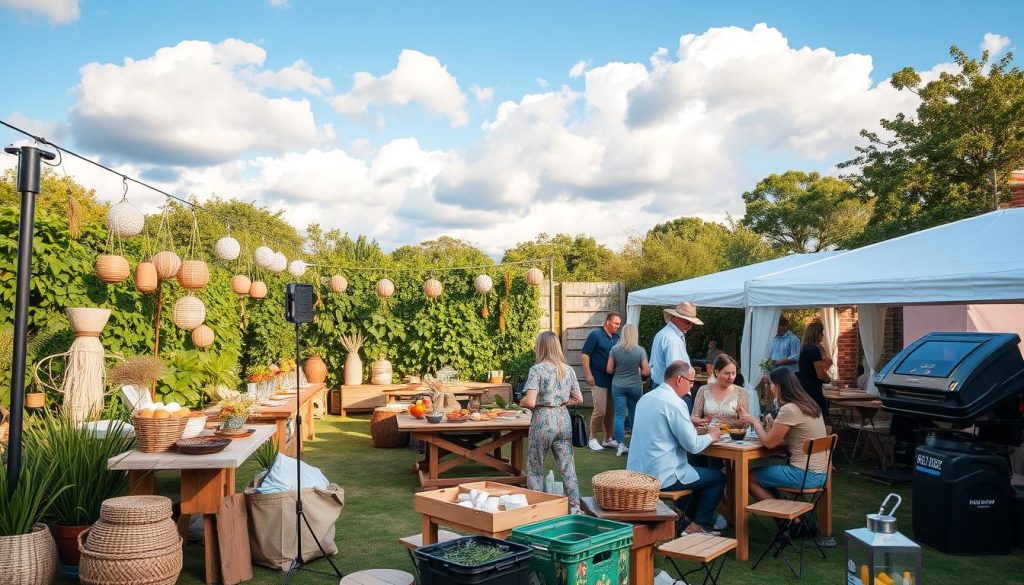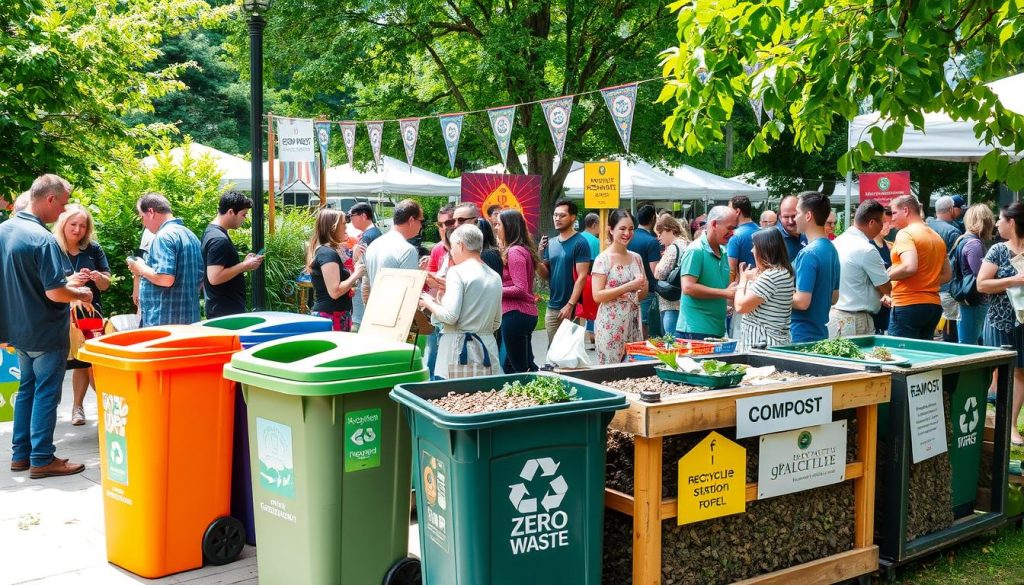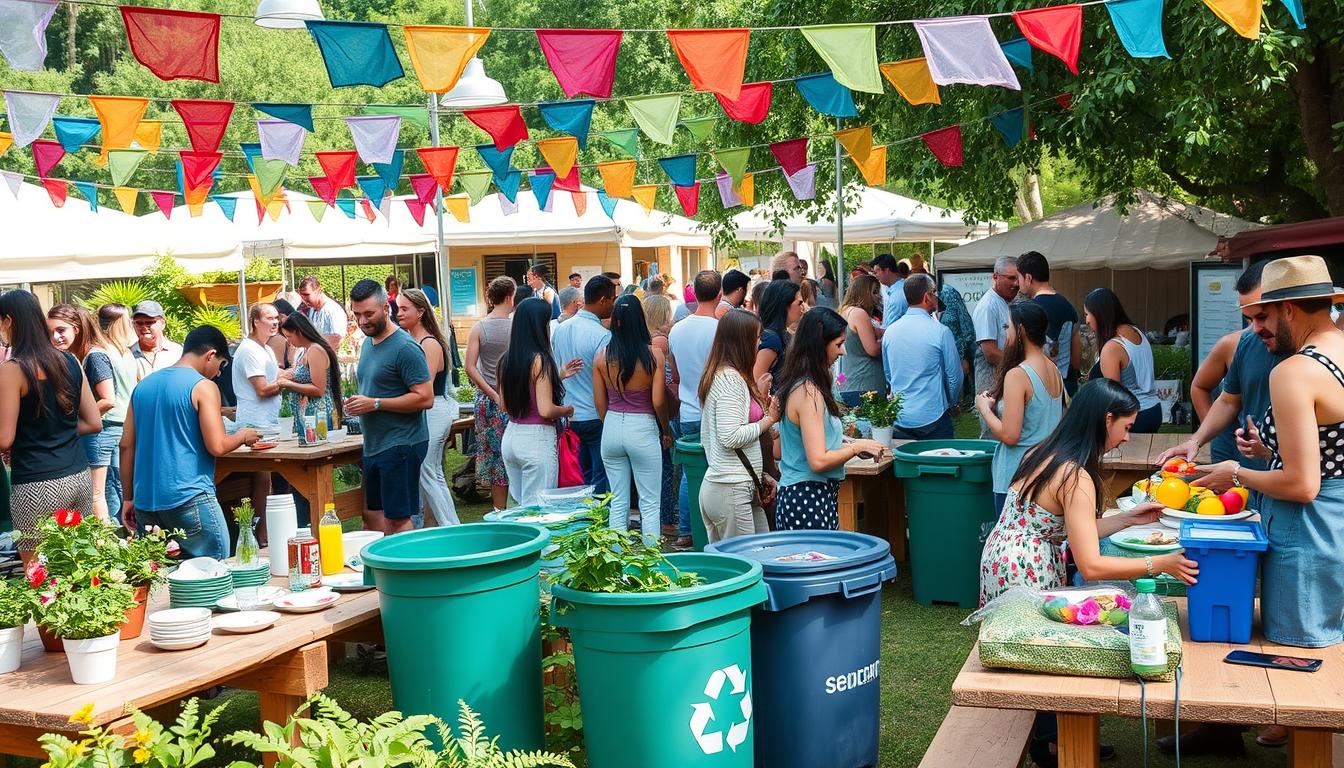Hosting zero waste events means creating an experience that’s kind to the planet. By using eco-friendly event management and sustainable production, you can cut down on waste. This helps make the planet a bit greener.
Planning carefully and thinking about every detail is key. It keeps waste out of landfills. This guide will show you how to make your next event eco-friendly.
Important steps include using biodegradable or reusable items, managing waste well, and teaching others about sustainability. Let’s explore how to make your event zero waste. This way, you can set a good example in the event planning world.
Understanding Zero Waste Principles
When planning sustainable events, knowing zero waste basics is key. Zero waste means we aim to get rid of all waste. It’s about living and planning without waste.
What is Zero Waste?
Zero Waste is a movement aiming to send no waste to landfills or incinerators. It’s about changing how we use resources. Many things we throw away can be recycled or reused.
The Importance of Waste Reduction
Reducing waste helps the environment and saves money. Sustainable events cut pollution and save resources. They also save energy and lower waste disposal costs.
Here’s why reducing waste is good for the planet:
- It cuts down pollution from landfills
- It saves natural resources
- It uses energy more efficiently
- It supports a circular economy
By following these principles, we help create a greener future. We also inspire others to plan sustainable events.
Planning Your Zero Waste Event

Hosting a zero waste event requires careful planning. Key steps include setting clear goals, choosing the right venue, and making a budget. Let’s explore these steps to make your event eco-friendly and successful.
Setting Clear Goals
Defining success for your event means setting clear waste reduction goals. I aim for specific recycling rates or less landfill waste. Having clear targets helps track progress and make adjustments for a greener event.
Selecting a Suitable Venue
Finding the right venue is crucial for green events. Look for places that support sustainability. Venues with composting, recycling, or renewable energy are great choices.
Creating a Budget
Creating a budget is essential for any event. But, doing it with a green focus adds more thought. Include costs for eco-friendly items like biodegradable utensils and recyclable decorations. Also, set aside money for waste management services like composting and recycling.
Sustainable Supplies and Rentals

Planning a green event means choosing the right supplies and rentals. Making smart choices in materials and vendors is key. It ensures your event is waste-free and shows your care for the environment.
Choosing Eco-Friendly Materials
Using eco-friendly materials is essential for a waste-free event. Items like compostable tableware, recyclable decor, and reusable linens cut down on waste. They also reduce harm to the environment.
Here’s a guide to compare common event materials:
| Material Type | Eco-Friendly Alternative | Benefits |
|---|---|---|
| Plastic Utensils | Compostable Utensils | Reduces landfill waste; made from renewable resources |
| Single-use Tablecloths | Reusable Linens | Durable and long-lasting; easy to clean |
| Traditional Decor | Recyclable Decor | Can be reused or recycled, lowering waste |
Partnering with Local Vendors
Choosing local vendors for your event is smart. They often offer sustainable options and cut down on carbon emissions. Plus, supporting local businesses boosts the local economy and community.
To wrap it up, a zero-waste event needs careful planning. This includes choosing eco-friendly materials and working with local vendors. These steps are crucial for a successful, green event.
Waste Management Strategies

Effective waste management is key for green events. By using these strategies, I can cut down waste going to landfills. This helps meet zero waste goals.
Implementing Recycling Stations
Recycling stations are vital for green events. They should be easy to find and clearly labeled. This makes it simple for people to recycle right.
- Distinct bins for plastics, paper, and metals
- Instructions for proper disposal
- Staff or volunteers to assist attendees
These features make recycling stations easy to use. This boosts recycling rates and correct usage.
Composting Options for Organic Waste
Composting is also crucial for green events. It helps turn food scraps and biodegradable items into something useful. Here are some composting ideas:
- Partnering with local composting facilities
- On-site compost bins for easy disposal
- Communicating the importance of composting to attendees
Adding composting to the event’s plan makes it greener. It’s vital for a successful green event.
| Strategy | Benefits |
|---|---|
| Recycling Stations | Helps segregate waste, enhances attendee participation in recycling |
| Composting Options | Diverts organic waste from landfills, reduces overall waste footprint |
Engaging Attendees in Sustainability
Getting people involved is key to a successful zero waste event. By encouraging them to take action and sharing important info, you can really make a difference. This helps a lot with your eco-friendly event planning.
Offering Zero Waste Tips
Give people useful zero waste tips before and during the event. Tell them how to cut down on waste by using reusable items like water bottles and bags. You can also have workshops to teach them why reducing waste matters and how they can help.
Incentivizing Waste-Free Choices
Offering rewards can really get people involved in zero waste efforts. Give discounts to those who bring reusable cups or bags. Acknowledge those who make the most eco-friendly choices to build a sense of community. Friendly competitions or awards can make sustainable actions fun.
| Strategy | Description |
|---|---|
| Zero Waste Tips | Provide guidance on reducing waste, showcasing reusable alternatives. |
| Incentives | Offer discounts or rewards for eco-friendly behavior. |
| Workshops | Conduct sessions on sustainability and waste reduction. |
| Competitions | Organize contests that encourage zero waste practices. |
To engage people in sustainability, you need a smart plan. Focus on teaching, motivating, and building a community. With the right approach, hosting zero waste events can be fun and truly impactful.
Promotions and Marketing
Good promotion and marketing are key to making your zero waste event a hit. By sharing your event’s mission and activities, you can draw in more people. This makes your event a big success and good for the environment.
Leveraging Social Media
Social media sites like Instagram, Facebook, and Twitter are great for promoting green events. Share cool and educational stuff about reducing waste. For example, post videos on how to cut down on waste and eco-friendly tips.
Use hashtags about sustainability to reach more people. Talk to your followers with Q&A, polls, and live streams. This builds a community that cares about green events.
Collaborating with Influencers
Working with influencers who love sustainability can really help your event get noticed. They have fans who trust their advice. When influencers talk about your event, it encourages their followers to join in.
Pick influencers who share your green event values. Work together to make content that shows off your event’s unique features. This not only promotes your event but also teaches people about living green.
Remember, your goal is to attract people, educate them, and inspire them to live zero waste every day.
Measuring Success
It’s key to check how well a zero waste event did. We need to see its environmental effect and get better for next times. By looking at different numbers, we can see if we hit our green goals and find what to work on.
Tracking Waste Diversion Rates
One top way to see success is by watching waste diversion rates. This means figuring out how much waste was turned into compost or recycled. A high rate shows we did a great job making the event green. Use waste checks and tools to keep track.
Gathering Feedback from Attendees
But numbers aren’t everything. Hearing from people who came helps us know more about our event’s success. Surveys and feedback forms tell us what worked well and what didn’t. They also show how our event changed people’s views on being green.
| Metric | Description | Outcome |
|---|---|---|
| Waste Diversion Rate | Percentage of total waste composted or recycled | Measures success in reducing landfill contribution |
| Attendee Feedback | Surveys and feedback forms | Provides insights into attendee perception of sustainability efforts |
Overcoming Challenges
Planning a zero waste event comes with its own set of obstacles. But, with a proactive mindset and thorough planning, you can overcome these hurdles easily. Let’s explore common misconceptions and practical solutions for a successful green event.
Common Misconceptions About Zero Waste
Many think zero waste events are too pricey. But, sustainable event planning can actually save money. By cutting down on unnecessary buys and using reusable items, costs can be kept in check. Another myth is that zero waste is too complicated. With the right education and resources, it becomes simple and straightforward.
Solutions for Unexpected Waste
Even with the best plans, unexpected waste can still happen. It’s crucial to have a backup plan to keep your event green. Identify potential waste issues and find alternatives or recycling options beforehand. Working with local waste services for last-minute pickups is also a good idea. Keeping a waste log during the event helps you learn and improve for the future.
By tackling these challenges directly, you’ll not only have a smoother event but also pave the way for more sustainable events in the future.
